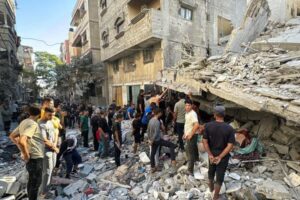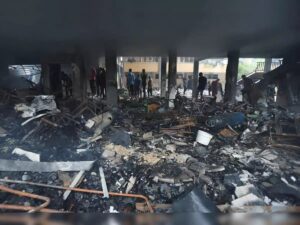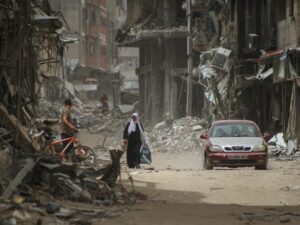A recent attack by the Israel Defense Force (IDF) that targeted a school hospital in Gaza killed 47 people in 24 hours. This aggravates conflict and attracts increasing international attention.
The facility was an education complex which was also a hospital, during the time of the conflict, it was alleged to be accommodating civilians who had relocated from the war zones. Physical and sexual violence was also used as well as the target of women and children and healthcare workers confirming increased vulnerability of non-combatants in the region.
The IDF has justified its use of military force as pre-emptive measures to deal with any threats posed by militant groups who entrenched themselves in civilian-dominated areas saying these are used strategically for military purposes.
The airstrike has profound questions on the use of authorized force and ethical issues of striking heavily-occupied civil infrastructure in war, which were previously considered legal sanctuaries.
Local and international nongovernmental organizations have criticized the action urging governments to take necessary action to safeguard civilians and infrastructure in Gaza. Regarding the ongoing war, the pressure on the international community to end the war by peaceful means is increasing and different leaders interfere with the parties and plead with them to consider the fate of the civilians. Such footage indicates that the conflict has a rather nasty human toll and needs brown cessation operations.

International Outcry And Condemnations
As seen in the recent attack where an Israeli Defense Force bombed a school hospital in Gaza killing 47 people, there has been lots of outrage and condemnation from various countries.
Many human rights organizations and leaders of the world have called for serious attention to the increased loss of lives among innocent civilians in Gaza. They are urging responsible warring factions to respect the rights of civilians with special regard to the protection of human beings in armed conflicts. UN, AI, and HRW have criticized the attack noting that under the laws of war schools and hospitals are inviolable and cannot be targeted.
France, Turkey, and South Africa are some of the countries that have also said there is a need to stop the fighting and avoid more loss of lives. Some leaders state that fighting in concentrations of people especially when amputations were children, elderly, or sick only increases the humanitarian problem and the violence.
The international community is putting pressure on both, Israel and Hamas to consider more protection of even the suicidal civilians and to look for political solutions to conflicts. When people around the globe are demanding accountability many are now invoking dialogues and peace to prevent further calamities.

The Growing Humanitarian Crisis In Gaza
The humanitarian crisis in the Gaza Strip is worsening as the conflict escalates, making conditions increasingly dire for citizens. Moreover, key facilities such as schools, hospitals, and residential areas have been severely damaged by airstrikes. The population is suffering from extreme shortages of food, water, medicine, and shelter, leading to starvation and severe hardship. However, the recent IDF attack on a hospital, killing 47 people, highlights the stark reality in Gaza, where civilians have little to no protection.
Humanitarian organizations report unbearable conditions, with Gaza’s health sector near collapse. Hospitals are full and lack essential equipment and staff to treat the rising number of injured civilians.
Blockades have severely limited the import and distribution of essential goods. Displacement in Gaza is rising quickly, with families seeking shelter as safe havens diminish.

The world demands urgent humanitarian access and an immediate halt to the fighting. Supporters stress the need for swift measures to reduce suffering and lower the fatality rate.
Furthermore, this article shows how the situation in Gaza could help exacerbate the problem regarding the conflict, which is the need to develop sustainable solutions and long-term peace-building operations for the protection and reconstruction of civilians.
